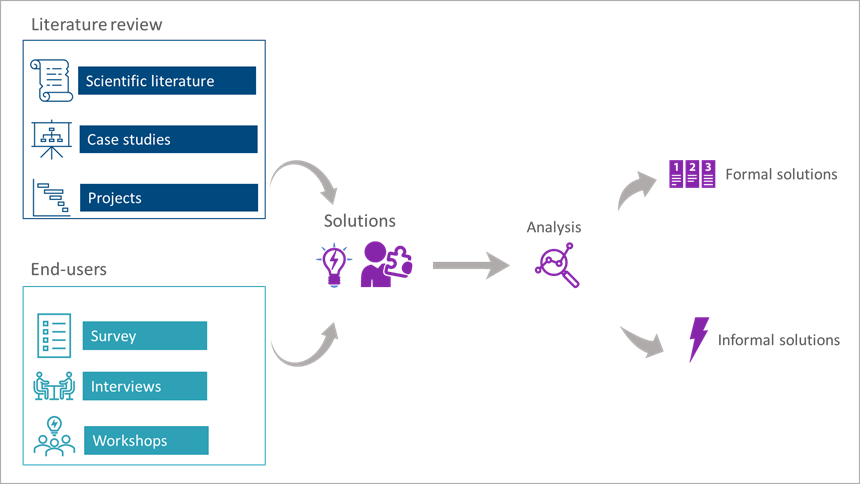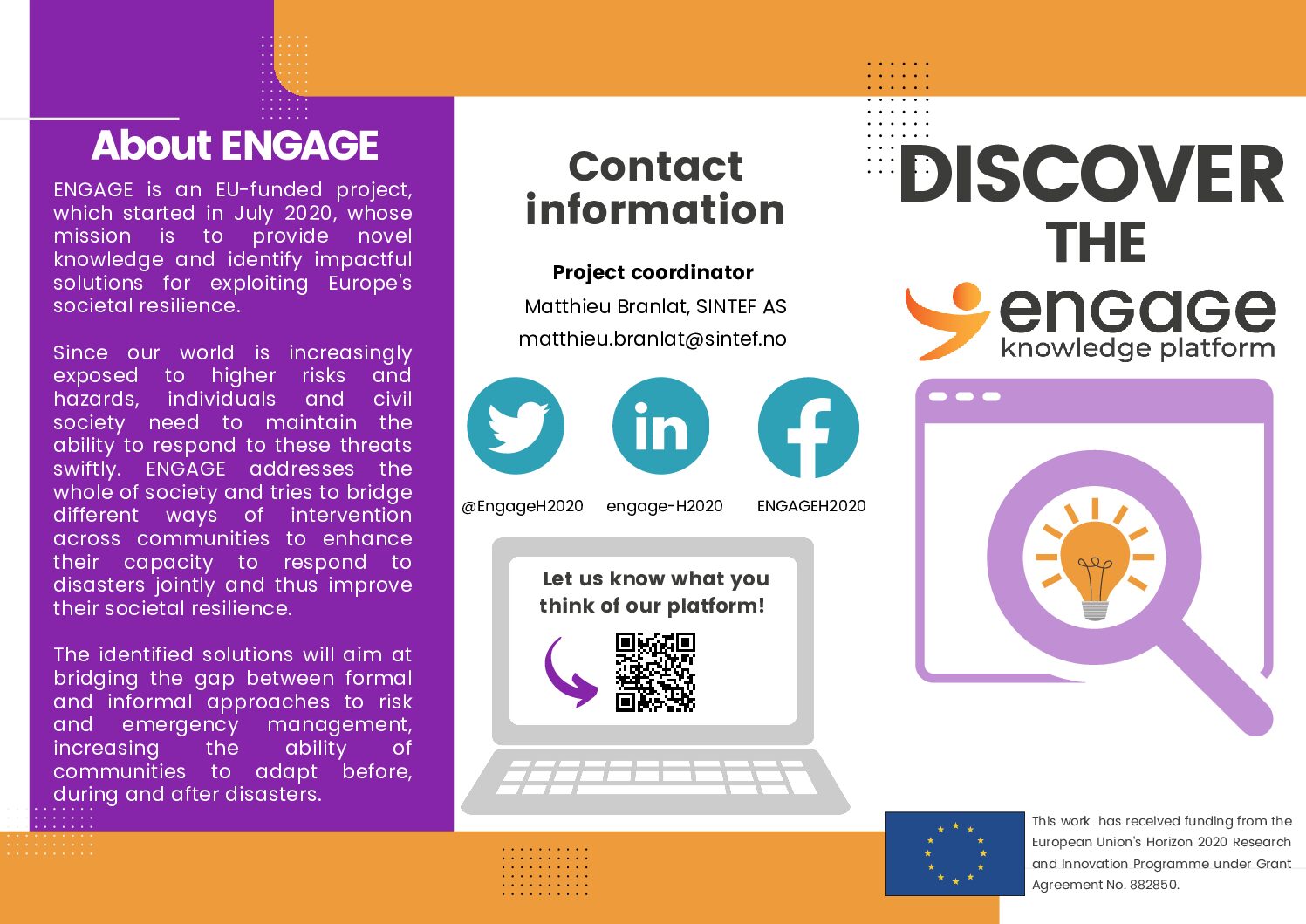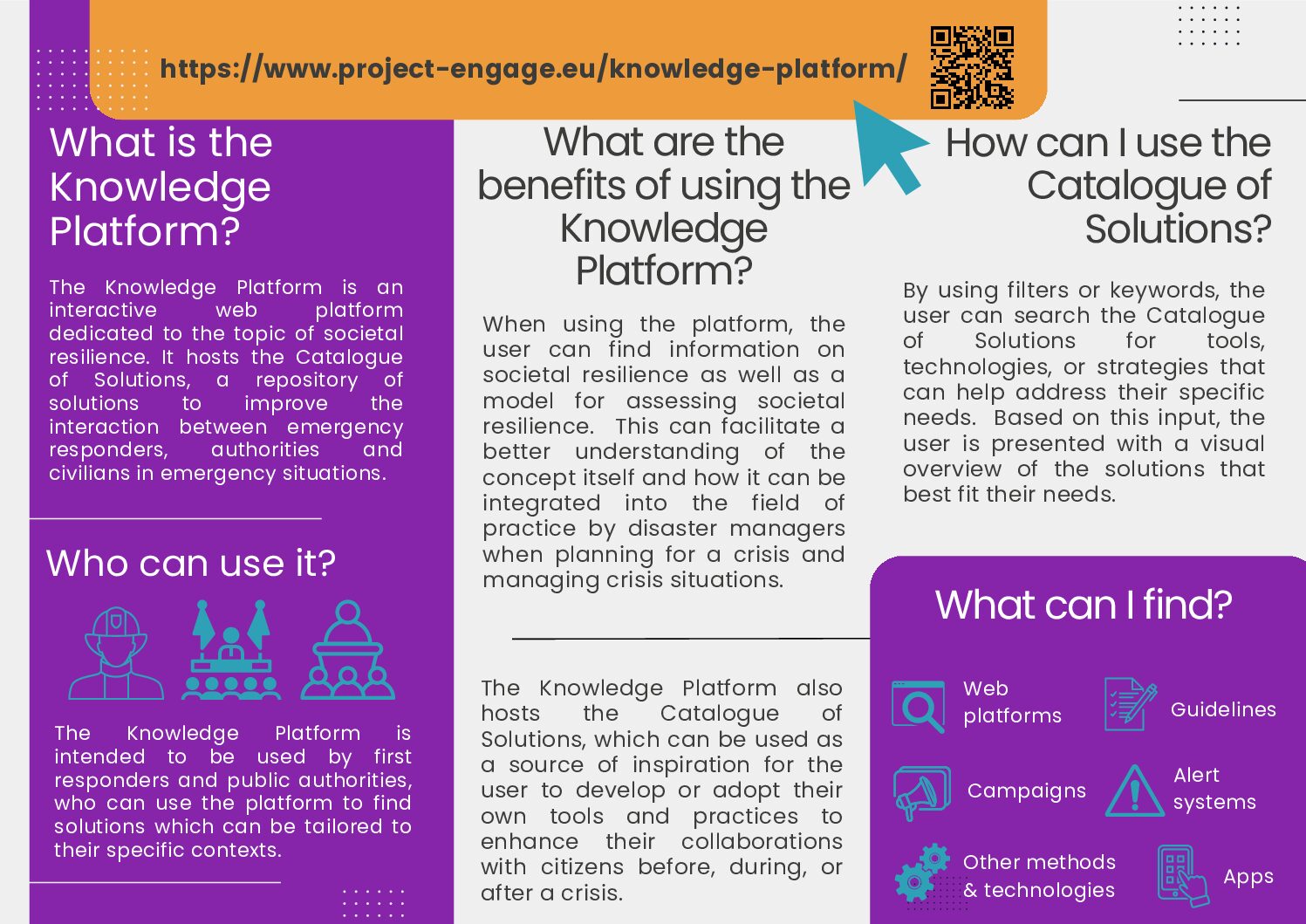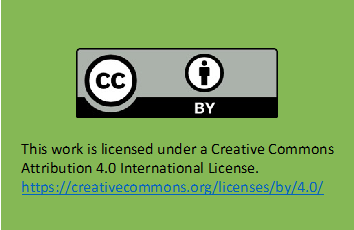What is the Knowledge platform?
The Knowledge Platform is an interactive web platform dedicated to the topic of societal resilience. It provides insight on how the whole of society, formal and informal actors, can enhance their capacity to respond to disasters jointly and thus improve their societal resilience. It hosts the Catalogue of Solutions, a repository of solutions to improve the interaction between emergency responders, authorities and civilians in emergency situations. The Knowledge Platform also describes some solutions that are not formally established but were taken in use by citizens in response to a crisis, and thus have the potential to enhance the response to a crisis.
Who is it for?
The Knowledge Platform supports first responders and public authorities in investigating approaches and solutions to reach the public and interact with them. Solutions normally need to be tailored to the specific contexts where are implemented and used.
Why to use it?
The users of the Knowledge Platform can find information on societal resilience as well as a model for assessing societal resilience. This can facilitate a better understanding of the concept itself and how it can be integrated into the field of practice by disaster managers when planning for a crisis and managing crisis situations.
The Catalogue of Solutions can be used as a source of inspiration for developing or adopting tools and practices to collaborate with citizens before, during, or after a crisis.
Where should you start?
Before browsing through solutions, we recommend you to first read the information on societal resilience that introduce to the main concepts. You may have a look to the glossary too that explain the terms used for classifying solutions.
How was the content developed?
Societal resilience model
The societal resilience model is a theoretical framework for assessing and enhancing societal resilience, i.e., the capacity for formal and informal actors to collaborate in disaster management. Being theoretical, the model builds upon main concepts defined in the research literature about societal resilience. Further, the model is grounded in the analysis of seven cases that vary in type of crisis, scale of the crisis and type of crisis management: L’Aquila earthquake (2009), Utøya terror attack (2011), Tōhoku Tsunami (2011), Fukushima Daiichi Nuclear accident (2011), Thalys train attack (2015), Swedish wildfires (2018) and COVID-19 pandemic (2020-2021). The analysis of the cases makes it possible to understand how actors participate in disaster management and the factors that influence participation.
Formal and informal solutions
The Knowledge Platform cover two types of solutions: formal and informal. These solutions are comprised of any means or instrument that emergency organizations and authorities can apply to reach the public and improve their interaction with them. This set of instruments covers guidelines, practices, services, strategies, technologies, tools, and applications that could help enhance the interactions.
A solution is formal when it is replicable, defined, and developed beforehand to be used in a specific situation, after studying its suitability to be applied in these established situations and with specific goals. A solution is informal when it is created on the fly because a formal solution is non-existent, not suitable to handle the situation, or because it cannot be applied due to some specificities of the context. In summary, the extent of formality of the solution highly depends on the actors utilizing it and the procedures applied.
To identify the solutions, we followed different methodologies. These methodologies cover two main sources of information, academic and practical. In the academic one, we searched academic literature to identify solutions. While for the practical one, we relied on emergency experts (end-users) who have hands-on experience applying these types of solutions.
- Academic sources of information:
- Scientific publications
- Case studies
- Project reports
- Practical sources of information:
- Survey
- Interviews
- Workshops
All the solutions are described using some basic information such as the solution title, short description, where it was used, which emergency responders’ need it serves and the solution provider. However, for some solutions we included more information, or in our words, we in-depth characterized them. We added information such as the contextual factors that impact the implementation of the solution, and to what extent the solution could be applied in another context. The solutions that were chosen for the in-depth characterization were recommended by the KI-CoP members of the project.

How do I use the Platform?


Everything you need to know about the knowledge platform
About the KI-CoP – our Advisory Board
To favour the collaboration and the interaction between different actors of society, the consortium is complemented by a special advisory board: the Knowledge and Innovation Community of Practice (KI-CoP).
The KI-CoP is an open association supporting the project ENGAGE as users and co-owners of its solutions. The inclusion of the KI-CoP in the activities ensures the validation and transferability of solutions, guidelines and methods across different risk and disasters scenarios.
Who is part of the KI-CoP?
- First Responders such as Fire Fighters, Police, Law Enforcement Officers, Emergency Medical Technicians, Doctors in the field of emergency, Paramedics, Red Cross Volunteers, Community Emergency Response Teams, Civil Protection, etc.
- Authorities and Citizens Representatives
- Non-Governmental Organizations (NGO)
- Researchers, Scientists or SME Operators in the field of Emergency, Safety and Societal Resilience
- Virtual Operations Support Teams: Emergency Communication Officers, Emergency Message Operators
How is the KI-CoP involved?
The KI-Cop is regularly included to share experience, gather a critical view on project work, co- create, adapt and validate project results. Practitioners take part in interactive activities such as focus groups, semi-structured interviews, surveys and validation exercises. Specific events are organized to foster the collaboration with the Consortium.
Become part of the KI-CoP
Are you a practitioner or researcher in the field of risk management, safety and societal resilience? Sign up through this form to join our Community of Practitioners.
About ENGAGE
The Knowledge Platform is a result of the EU-funded project ENGAGE. The project is about strengthening the cooperation between formal actors, such as first responders and authorities, and informal actors, such as citizens and communities, to prepare for, prevent, respond to, and recover from disasters.
ENGAGE brings together 14 partners from 8 countries aiming to show how individuals and local practices can cooperate effectively with planned preparedness and response, practitioners, and technology.
Visit ENGAGE web site to learn more about the project and its results: https://www.project-engage.eu
Creative Commons CC BY 4.0 license
People using this result can: share, copy, redistribute, adapt and build upon the material for any purpose, even commercially. The attribution is that people using the guidelines must give credit to the ENGAGE project and EC support. No warrants are given.


